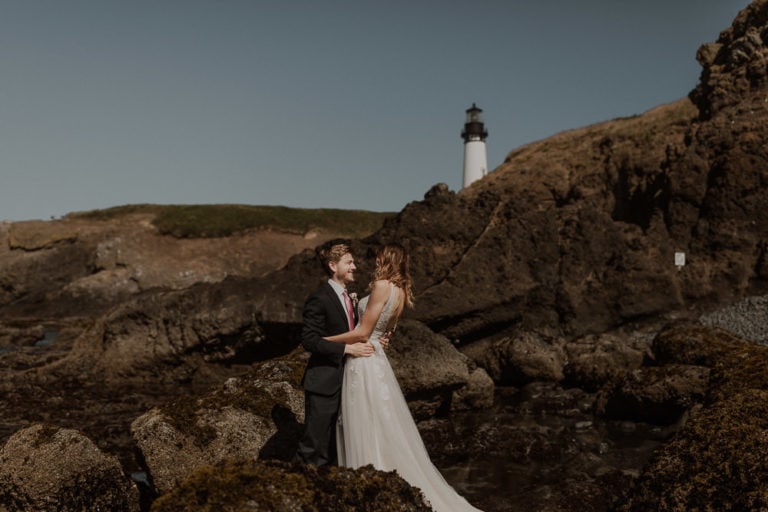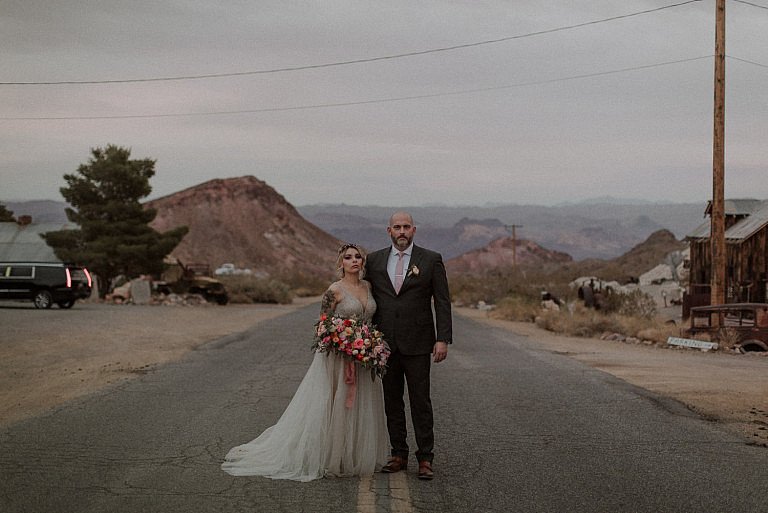How to Have An Eco-Friendly Elopement
I’ve been living an eco-friendly, sustainable lifestyle for the last several years and I am so passionate about not only helping couples have their best day ever but also making sure we don’t damage our earth in the process. I’ll happily accept the term “crunchy hippie” if I know that I’m doing my best to leave a positive impact when I’m gone. If you follow me on Instagram you’ll see the sustainable swaps I use in my daily life and I’m always posting about ways you can reduce your footprint and feel good about the way you live.
When we got married, my husband and I made sure to stick to our ethics by making everything ourselves, purchasing local or second-hand, and not having any single-use products. Being sustainable for your elopement isn’t about being perfect. But once you start thinking intentionally about every choice it becomes clear that you don’t need all the surplus stuff. I know it can feel like all these small changes don’t really matter, but I think living consciously has helped me live a more enjoyable life. I’ve given myself more of a purpose and always know there’s a why behind my choices instead of just living in this body surrounded by star matter.
Table of Contents:
There are so many buzzwords for this topic now that it can get a little confusing. Eco-friendly, eco-conscious, sustainable, going green, and zero-waste really all come down to living intentionally. Because it’s getting so popular, you have to watch out for greenwashing. Greenwashing is when a company or product claims to be eco-friendly but isn’t at all. It’s important to do your research ahead of time before buying anything new!
HAVING AN ECO-FRIENDLY ELOPEMENT IS ABOUT MAKING REPEATABLE CHOICES.
Having an over-the-top or lavish wedding is only a trend. It’s a result of America’s over consumerism and it’s completely unsustainable. Just by choosing to have an elopement or intimate wedding, you’re already making a huge impact on the amount of waste created. I love that you’re doing that! If this is the start of the next chapter of your life, make it a good one.
Learn about more reasons couples are choosing to elope and find out exactly what having an elopement means on these blogs.
10 Ways to Have An Eco-Friendly Elopement
1. Go Plastic Free
Going plastic-free for your elopement might be easier than you expect! Bring a reusable water bottle instead of plastic. Don’t even think about confetti, sparkles, or sequins. Balloons are all the rage right now, but they aren’t eco-friendly. They don’t use “natural latex,” which is the only biodegradable balloon product. Instead, choose items made with natural fibers or dried plants and that are durable and can be reused.
2. Go Paperless
One of the immediate benefits of choosing to elope means you have far fewer guests to try to coordinate. This makes going paperless almost effortless! Skipping the paper save-the-dates, invites, envelopes, and table seating helps to save you a few hundred dollars too. Instead, you can notify everyone electronically with a custom wedding website.
3. Sustainable Flowers
Purchasing in-season flowers and shopping locally has a huge impact on how damaging your flowers can be. Most national parks don’t allow any type of flower at all because of how terrible the chemicals and mixing the non-native species are. Getting your flowers from a local artist means they are much more likely to have been locally grown and not shipped all over the world already. Like with most environmental things, you won’t see the effects of any invasive species you bring to an environment on the day of your wedding. This is probably why so many people don’t understand just how big of an impact each step we make has on fragile ecosystems.
If you choose to use lots of florals at your elopement, consider donating the extras afterward to nursing homes or hospitals so they can be enjoyed to the absolute fullest before being thrown away. Other ways you can reuse your leftover flowers is by pressing them and hanging them as art or sending them to an artist to turn your florals into dye on a robe.
Learn how to press your own wedding flowers here.

4. Ethical Jewelry
Diamonds and other jewels have a long history of corruption, over-consumption, massive environmental impacts, emissions, and waste. You can read an in-depth article on the importance of sustainable and ethical jewelry here. There are a few ways you can think more sustainably about your jewelry. Purchase your jewels from local, eco-minded jewelers. This option will give you a one-of-a-kind item. By buying from a local jeweler you will also make the process more personal than trying to shop for something you love in a big box store. I designed my own ring and worked directly with a jeweler. My husband and I picked out our own diamond, learned about the process, and I was able to include the diamonds from my mom’s wedding ring in mine which made it really special.
There are also companies where you can purchase man-made diamonds. These jewels are created in a lab without damaging ecosystems or disparaging communities. They look just like the “real” thing and you’ll never know the difference!
5. Local Vendors
Food waste is one of the biggest polluters in the world. Choosing local vendors for your elopement helps support that community. I encourage you to have a plan already in mind for any leftovers and choose vendors who source locally. Those ingredients will be fresher anyway! It’s also important to keep in mind the number of animal products you consume. I know eating plant-based isn’t for everyone, but you might be surprised how great of a meal you can have just from plants.
6. Sustainable Attire
Second-hand attire, renting or borrowing, and using sustainably harvested materials are the key ways to have eco-friendly wedding attire. There are so many different options out there for your wedding clothes that it’s easy to think ethically. One big downside to purchasing ethically made clothing is that it is still quite a bit more expensive than the mass-produced ones. If that is out of your budget, second-hand is the perfect option. Finding an outfit and tailoring it to your tastes and fit reduces waste and gives life to something all over again. There are a lot of companies out there who rent wedding dresses, bouquets, and decor. I think this is a result of our digital world and it’s really cool!
When your wedding day is over, consider donating it to a company like Brides For A Cause.
You can learn more about how I made my own wedding dress here.

7. Decor
My two biggest tips for your wedding decor are to use what you already have and to think creatively. Candles, plants, printed photos, or books can make perfect centerpieces and accents. Party favors aren’t necessary, but if you want to have them, make sure it’s something useful! I hand-made candles for each of our guests instead of opting for plastic-wrapped candy or a fan with our faces on it. We kept 80% of our decor after it was over and use it throughout our home. Using the decor in our home serve as cute little reminders of an amazing day. The rest we donated or gave to another wedding couple!
Another thing to keep in mind is that many ceremony locations don’t allow any outside props like arches, rugs, etc. This damages the ecosystems so it’s important to know this ahead of time when you’re picking your locations. Alternatively, if you’re eloping, you’re probably already picking an amazing location. Don’t add anything extra and just enjoy nature!
8. Location
Which location you choose will determine a lot of your other factors for your elopement. Your decor, attire, available vendors, and any travel involved is dependant on your environment. Be sure to abide by Leave No Trace during your elopement and help guests do so as well. Don’t remove anything from the location and make sure you don’t leave any trash behind. If you plan to bring a lot of guests then choosing something closer to where they are located will help with the travel emissions. If you prefer to have a destination elopement, then you’ll probably want to reduce the number of people you bring with you.
Leave No Trace Principles
- Plan Ahead & Prepare – By making your plan ahead of time you won’t have to worry about any surprises on your wedding day
- Travel on Durable Surfaces – Keep yourself and your guests safe by abiding by signs and fences
- Dispose of Waste Properly – Don’t leave trash behind for animals to find. Bodily waste carries bacteria and other harmful products
- Leave What You Find – Altering the site has a lasting impact that can be seen and felt for years to come
- Minimize Campfire Impacts – Unattended campfires can burn the entire forest down. Be smart about your fire usage
- Respect Wildife – Just leave them alone in their natural habitats
- Be Considerate of Other Visitors – Allowing everyone to enjoy what nature has to offer is how we learn about the earth together
Pro Tip: Don’t forget about permits. Permits can be pricey and difficult to get, but it’s imperative you abide by the laws of use for each spot. Public lands are amazing but terribly under-funded. Elopements are getting more and more popular which means a greater number of people are using the land. It’s important to respect the land we have so we can continue to appreciate it in the future. I always help my couples with the permit process to ensure everything is ready to go ahead of time.
For some Oregon elopement location ideas, check out this blog post.


9. Guest List
This one is pretty simple: the fewer people you invite, the less waste you will have. You can’t control what your guests do, so if it’s important to you to have a sustainable elopement, then you’ll want to keep that in mind.
If you do have guests, ensure there are bathrooms available, proper disposal services, and a clear pathway for them to use.
10. Ethical Tourism
Ethical tourism is about considering the consequences of your actions on the local economy and the environment. One of the ways you can be more ethical while traveling is to pay attention to the price. A lot of the time, cheaper isn’t better, as it means the company is cutting corners somewhere else. While traveling, it’s important to respect cultures and customs, and going in the off-season is an easy way to not participate in over-tourism. Doing just a little bit of research will teach you about what is happening in that local economy. For example, Hawaii is currently suffering massively from over-tourism. SO many people are taking advantage of the cheap airfare after the pandemic. It’s overwhelming the local economy and damaging wildlife. It’s honestly really sad and I don’t think a lot of people understand or even know that this happens.
If you’re having a destination elopement or just love exploring your location then combing your elopement and honeymoon is a great way to lower your impact. You can also travel to lesser-known spots, which are likely to be far more interesting than yet another resort!
I know that’s a lot of information and it’s kind of a heavy topic. Living eco-friendly and helping my couples have sustainable elopements is so important to me. I hope you liked all of these tips on how to have an eco-friendly elopement!
If you want some more ideas and inspiration then come check out the blog!






